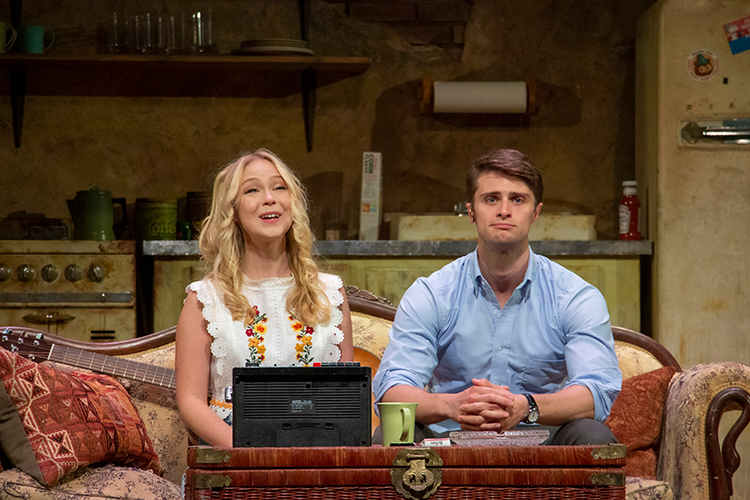As he welcomed the audience to the opening night of Riverside Theatre’s 50th season, Allen Cornell, producing artistic director and CEO, commented that it had been three years since he last spoke at an October opening, given that the pandemic had played havoc with its productions.
Cornell noted that he had deliberately chosen to open with the frothy 1960s comedy “Butterflies Are Free,” a play from the era of Riverside’s early beginnings, to celebrate its half-century milestone. It’s the kind of play which, at that time, was a Broadway staple: a small cast, in a one-set comedy of the Neil Simon mold. In this case the play, written by the American playwright Leonard Gershe, ran for three seasons from 1969 to 1972.
And, although it is not the type of splashy musical with which Riverside might typically launch its season, it’s a charming of-its-time romantic comedy with likeable characters and plenty of laughs. In short, it’s an ideal play to begin the ramp-up to bigger productions later in the season.
The story centers on Don Baker, a young, aspiring songwriter who happens to be blind. Played by Alec Nevin, Don has moved into a New York City apartment to break away from his sheltered Scarsdale upbringing and assert his independence. His protective, worried mother has reluctantly agreed to a two-month trial period, during which she’s not allowed to intrude on his autonomy – and staying away is driving her crazy.
Don’s next-door neighbor, Jill Tanner, recently divorced after a six-day marriage, quickly insinuates herself into his apartment and his life. She’s as effervescent and talkative as he is introspective and reserved, so it’s pretty clear from the outset that romance is in the stars.
Jill is so self-absorbed and chatty that it takes her quite a while to notice Don’s blindness, during which he enjoys the absence of the awkwardness that results after she does so. As Jill, Allison Elaine is a delightful dervish, nosing about Don’s apartment, unselfconsciously twirling and striking dramatic poses as she chatters about her aspirations to become an actress.
She’s the definitive child of the sexually liberated ’60s, and it doesn’t take long before sparks fly between the two. He is smitten before nightfall, and when his mother arrives unexpectedly and finds the two picnicking in their underwear, well …
If the story is unsurprising, its unfolding is still lots of fun. There are laugh-out-loud moments throughout.
Laurie Carter Rose, as Don’s mother Mrs. Baker, accomplishes the remarkable task of playing a seriously unfunny woman who nevertheless says many comical things. Her rigidly perfect posture, and the way she pulls down the hem of her suit jacket (the period costumes by Anna Hillbery are spot on) scream “uptight.” Yet she elicits our sympathy as her anguish over her fledgling child leaving the nest butts against her desire to see him self-sufficient and happy.
As Don, Nevin rises admirably to the challenge of playing a sightless character, doing so with subtlety and a straightforwardness that doesn’t call undue attention to itself. He also rides the emotional roller coaster of falling for Jill, whose flakiness may undermine their relationship before it can take hold, while deflecting the overbearing attention of his mother and the chinks it creates in his self-confidence.
Alec Ricardo Ruiz completes the cast with a juicy scene in the second act as Ralph, the director of the outlandish avant-garde play for which Jill auditions. He’s decked out in full hippie-dippy regalia from headband to bellbottoms, for a look as overblown as his ego.
Director Cornell keeps the pace vibrant and the movement fluid, guiding his cast to moments of heightened emotion that are almost always leavened with humor.
His scenic design nicely evokes the downscale New York of the era, with industrial light fixtures and exposed pipes, plaster chipped away to reveal patches of brick, and a dingy skylight. A loft bed, director’s chair, clawfoot bathtub and beaded curtain further plant us in those groovy days, while amplifying Mrs. Baker’s mortification at her son’s living conditions.
Playwright Gershe based his work loosely on the life of attorney and activist Harold Krents, an early advocate for disability rights. The original production starred Keir Dullea and Blythe Danner, who won a Tony Award for Best Leading Actress in a Play. Eileen Heckert repeated her stage performance as Mrs. Baker in the 1972 movie adaptation and won an Academy Award for Best Supporting Actress. Her co-stars in the film version were Goldie Hawn and Edward Albert.
The program notes the time of the play as “the Age of Aquarius,” and Ryan Gravett’s sound design effectively deploys radio hits of the day to transition between scenes. As Cornell pointed out, it’s the era when he himself, and perhaps most of Riverside’s audience, were the age of the protagonists, and indeed many of us remember that period warmly – even if through rose-colored glasses.
“Butterflies Are Free” performs through Nov. 13 on the main stage at Riverside Theatre. Tickets start at $45 and can be purchased by calling the Box Office at 772-231-6990, or online at riversidetheatre.com.
Photos provided

